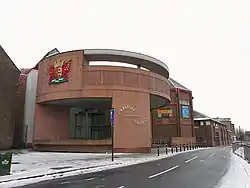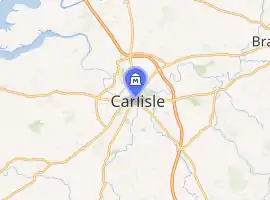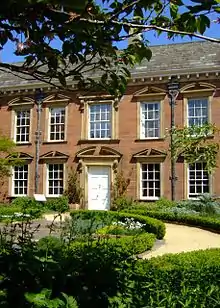Tullie House Museum and Art Gallery
Tullie House Museum and Art Gallery is a museum in Carlisle, England. Opened by the Carlisle Corporation in 1893, the original building is a converted Jacobean mansion, with extensions added when it was converted. At first the building contained the museum and also a library, an art school and a technical school.[4][5]
 | |

| |
| Established | 1893 |
|---|---|
| Location | Castle Street, Carlisle CA3 8TP, England, United Kingdom |
| Coordinates | 54.8952°N 2.9405°W |
| Visitors | 240,000 (2018) [1] |
| Chairman | Andrew Smith [2] |
| Director | Andrew Mackay [3] |
| Website | www |
The building, including the extensions, is a Grade I listed building,[4] and the wall, gates and railings in front of the house are separately Grade I listed.[6]
The two schools were moved in the 1950s and the library in 1986. The museum expanded into the city Guildhall in 1980 and with new space available from 1986 it underwent an extensive redevelopment over 1989–90 and again in 2000–01.
Since May 2011 the museum has been an independent charitable trust, the Tullie House Museum and Art Gallery Trust.[7] It is one of the three members of the Cumbria Museum Consortium, along with Lakeland Arts and the Wordsworth Trust.[8] In 2012–15 and 2015–18 this consortium was one of the 21 museums or consortia (16 in the earlier period) to be funded by Arts Council England as "Major Partner Museums".[9]
Collections
The museum has large and eclectic collections of zoological, botanical and geological material. The plant collector, Clara Winsome Muirhead worked at the museum in the 1940s and donated a large collection of botanical specimens to the museum. The fine and decorative arts collections include works by Burne-Jones and other Pre-Raphaelite artists, as well as Stanley Spencer, Winifred Nicholson, Sheila Fell and Phil Morsman.
Musical instruments
There is collection of stringed instruments including a violin by Andrea Amati from the royal collection of France.[10]
Roman Britain
There were two Roman forts in Carlisle, one of which, Uxelodunum (or Stanwix to use the modern toponym), was the largest along the length of Hadrian's Wall. The museum houses important collections and temporary exhibitions associated with Hadrian's Wall.[11]
Post-Roman history
The human history collection also features permanent exhibitions dedicated to the Vikings and the Border Reivers.
Accolades
Tullie House Museum won the annual Family Friendly Museum Award (sponsored by the Telegraph Media Group) in 2015.[12]
Gallery
 Tullie House
Tullie House.jpg.webp) Centre piece of Roman Jupiter mount (FindID 195405-153331)
Centre piece of Roman Jupiter mount (FindID 195405-153331) Arthur Hughes - The Rift within the Lute
Arthur Hughes - The Rift within the Lute
References
- https://www.tulliehouse.co.uk/sites/default/files/attachments/pages/th_annual_review_2017-2018_digital.pdf
- https://www.tulliehouse.co.uk/about-us/governance/trust-members
- https://www.tulliehouse.co.uk/about-us/governance/trust-members
- Historic England. "Tullie House and Extensions, 15, Abbey Street (1297353)". National Heritage List for England. Retrieved 16 July 2015.
- "Tullie House and extensions: Detailed Record". historicengland.org.uk. Historic England. 2007. Retrieved 6 September 2008.
- Historic England. "Wall, gates and railings in front of Tullie House, Abbey Street (1196978)". National Heritage List for England. Retrieved 16 July 2015.
- "About us". Tullie House Museum and Art Gallery Trust. Retrieved 16 July 2015.
- "Home page". Cumbria Museum Consortium. Retrieved 16 July 2015.
- Atkinson, Rebecca (1 July 2014). "ACE increases number of Major Partner Museums". Museums Journal. Museums Association. Retrieved 16 July 2015.
- "Amati violin". Tullie House. Retrieved 31 August 2020.
- Roman... Archived 3 October 2016 at the Wayback Machine
- Steel, Patrick (2015). "Tullie House wins Telegraph..." Museums Association. Retrieved 29 March 2016.
External links
| Wikimedia Commons has media related to Tullie House. |
- Official website
- iRomans Website about Carlisle and the region's Roman history
- Charity Commission. Tullie House Museum and Art Gallery Trust, registered charity no. 1143235.